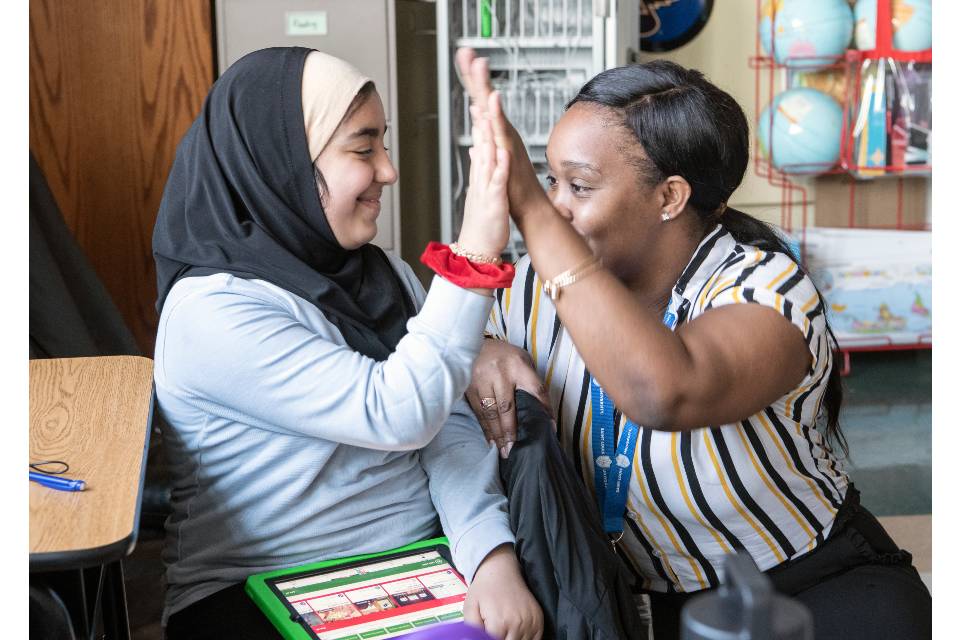Saint Louis University’s School of Education to Implement Redesigned Undergraduate Curriculum
Saint Louis University’s School of Education is excited to announce the rollout of its newly redesigned undergraduate teacher education curriculum, which will be implemented in fall 2022. SLU’s Bachelor of Arts in Education program is grounded in Jesuit and Catholic values and includes such hallmarks as a focus on equity guided by inquiry for the purpose of advocacy.
Key features of the new program will include students participating in early and frequent field experiences, engaging in a yearlong student teaching experience for all certification areas and earning certification through the Missouri Department of Elementary and Secondary Education (DESE).
Our newest curriculum will offer our future students effective and innovative new ways to change classroom practices and to influence student learning to meet the needs of all learners in our ever-changing world."
Jessica Leonard, Ph.D., undergraduate program director and assistant professor in educational studies
The goal of the redesigned program is to prepare equity-minded new teachers who are committed to social justice, represent the diversity in schools and the broader communities, and are dedicated to meeting the needs of children and families.
The undergraduate teacher education program will continue to serve the same population of traditional students at Saint Louis University as well as to expand to include a more racially, ethnically and gender diverse group of students. With the implementation of this curriculum, the goal is to increase enrollment of new students to about 50 per year. The program aims to prepare students who want to attain a sound educational background and to develop leadership qualities, including risk-taking, civic responsibility and ethical character.
“Working with our dedicated faculty and community stakeholders, and with input from university colleagues, we have transformed our model of teacher preparation,” says Merlene Gilb, Ed.D., assistant professor of educational studies. “Along with acquiring the skills to be a high-quality teacher, our redesigned program is focused on preparing teachers for the next decade and beyond who are both sensitive and responsive to the uncertainties in our world, our social and educational systems, and the evolving needs of our diverse society.”
Fundamental Features of the Curriculum
A distinct feature of the redesigned program is that it will include a single track and common courses, which will allow for students from all certification areas to come together and to develop an understanding of a comprehensive educational program. Graduates will learn about the overall progression of development for learners from birth through 12th grade.
SLU teacher education students enter a tight-knit community of faculty and peers committed to innovative learning, diversity and inclusion, and the intellectual ideas of the Jesuit tradition. They are prepared to practice “Cura Personalis” – care for the whole person – and work for social justice in their communities. Students will graduate prepared to collaborate with families, build classroom communities, set high expectations for all students, and advocate for social change.
Teacher Learning Communities (TLCs) are also integrated throughout the program and will provide an opportunity for reflection on all coursework and field experiences. TLCs model professional learning communities for graduates’ professional futures and will be a laboratory where faculty are engaged side by side with students.
Certification Areas and Themes
The SLU teacher preparation program consists of 120-130 credits, depending on certification area. Students choose from several certification areas, including early childhood education, elementary education, middle school education (language arts, math, science, social science), secondary education (English, math, social science) and special education for mild and moderate disabilities.
Five compass themes are interwoven throughout the curriculum, which will guide students personally and in their future teaching: sense of identity, honoring learners’ multiple and complex identities; sense of purpose, advocating for thoughtful social action; sense of context, advocating for consideration of diverse points of view, including historically-minoritized voices at all levels of decision-making; sense of inquiry, developing current solutions to educational questions, issues, or problems that go beyond contemporary perspectives, assumptions, and biases; and sense of praxis, modeling and advocating for curricular decision-making that prioritizes learners.
“We are so proud of this redesign,” says Molly Schaller, Ph.D., associate dean of the School of Education. “It is particularly edifying to watch faculty embrace change, innovation, and their values and then design a program that will reach all of their goals. This program will be a transformational experience for our future students and their future students.”
For more information about Saint Louis University’s School of Education or the new undergraduate teacher education curriculum, contact us at: slued@slu.edu.
